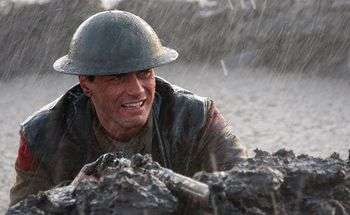Passchendaele

Passcheandaele (2008) is a Canadian war film chronicling the events of the Battle of Passcheandaele during World War I. Written, produced and directed by Due South actor Paul Gross (who also stars in the lead role), the film follows a war veteran who heads back into the war to protect a young boy from harm.
Set during the height of the war, the film tells the story of Sergeant Michael Dunne (Gross), a Canadian soldier who is wounded during the Battle of Dieppe and is nursed back to health by a woman named Sarah. He is diagnosed as neurasthenic (what is now known as post-traumatic stress disorder) and returns to his hometown of Calgary, Alberta to work as a war recruiter. Sarah's asthmatic brother, David, enlists in the war effort and demands that he is recognized by the father of his girlfriend, Cassie. Sarah believes that Michael is responsible for David's enlistment, and blames him for getting her brother involved in the army. To save David's life, Michael re-enlists with him (using a cover name), and they are sent to the frontline during the Battle of Passchendaele - one of the bloodiest military battles in Canadian history.
At a budget of $20 million dollars (CAD), it is the most expensive film ever made in Canada to date. Passcheandaele was inspired by the experiences of Gross' grandfather, who fought in World War I. The film received mixed reviews when it premiered in Canada.
- Action Film, Quiet Drama Scene: Lots.
- A Father to His Men: Colonel Ormond (the commander of the Canadian forces at Passchendaele) is this to his troops, while Dunne acts as a father figure to David.
- Anti-Hero: Michael Dunne is somewhere between Type II and III. He became such because he's a thoroughly Shell-Shocked Veteran.
- Armor Is Useless: Seen in the final battle. Many of the troops holding the line are messily killed due to their lack of protection.
- Battle in the Rain: The final battle at Passchendaele.
- Bittersweet Ending: Dunne dies, but the Canadian forces take Passcheandaele - at a very steep price.
- During the War: Set in 1917 and mostly chronicling the atmosphere of the Canadian home front.
- Field Promotion: Dunne is immediately promoted by the commanding officer at Passchendaele when his former liaison points out that he's joining the fight illegally.
- Florence Nightingale Effect : The attraction between Mike and Sarah is obvious from the get-go (to the point of getting lampshaded). Justified, since they've seemed to know each other for quite a long time while Mike was recuperating from his wounds in the hospital.
- Instant Death Bullet: Throughout the film, it usually takes only one bullet to kill a target.
- Logo Joke: The Alliance-Atlantis logo at the beginning of the film is played over a dark and rainy sky, with gunfire being heard in the background.
- Melodramatic Pause: Multiple times throughout the film.
- Mood Whiplash: A scene where a presentation describing the effects of mustard gas is shown to Canadian soldiers (complete with their horrified reactions) is intercut with a scene where two teenagers joke around and lose their virginity together.
- Mordor: What Passcheandaele looks like after the final battle.
- More Dakka: The German machine gun crews really know how to use their weapons.
- My God, What Have I Done?: Dunne comes down with post-traumatic stress disorder after stabbing a (possibly) unarmed teenage soldier in the head with a bayonet during the Battle of Dieppe.
- Patriotic Fervour: Dunne defies his liaison in Alberta to join the fight at Passchendaele and protect David, even though it amounts to insubordination.
- Pinned Down: The final battle has the Canadian forces pinned down by attacking German troops.
- Scenery Porn: The foothills of Alberta are shot in long, panoramic views, with minutes of screentime devoted to their imagery.
- Shell-Shocked Veteran: Dunne and his fellow soldier Royster.
- Try Not to Die: Dunne says this to David when he first leaves for France.
- Veteran Instructor: Dunne is brought back to Alberta to be an instructor after he's wounded at Dieppe.
- War Is Hell: World War I is portrayed very unglamorously not only in scenes set at the frontline, but even in those that are set on the Canadian home front (which is the majority of the film, really). One of the major plot points is the propaganda-fueled xenophobia towards people with ethnic ancestry in the nations of the Central Powers, particularly Germany. David and Sarah Mann's father is suspected by the authorities to have been a German collaborator and they receive a lot of unfair ridicule and insults because of this. They're actually Canadian-born, so the accusations are really little more than paranoia-mongering to get the populace into a genuine anti-German mood.